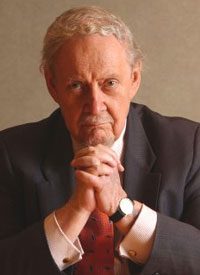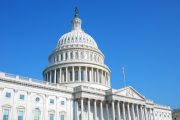
Bork, best known as an anti-trust scholar, is also known as an “originalist,” a term applied to those who are guided more by the Framers’ original understanding of the Constitution and less from personal values, beliefs, and morals. He has always advocated that a court’s task is not to “legislate from the bench.”
Now a lawyer, law professor, and author — his most recent book being A Time to Speak: Selected Writings and Arguments — he was interviewed by Cybercast News Service. In that interview he predicted potential looming legal battles and outright conflicts, ones that could significantly affect basic freedoms, including the "free exercise" of religion which is protected by the First Amendment to the U.S. Constitution.
Bork observed: “We are living with the vision of a Constitution that no longer exists. The reason is apparent. The Constitution, which for all practical purposes is [now] the Supreme Court, follows the elite culture.”
The judge alludes to the fact that many laws have resulted from Supreme Court decisions, acts of judicial usurpation, on issues that those who hold seats in Congress would never have touched:
The legislatures were not about to rule for abortion on demand, which is what the court did. The legislatures were not about to start working up towards same-sex marriage, which is what the court was doing with its ruling about homosexual sodomy. The legislature was not about to do away with the death penalty, which the court is whittling away with a view to getting rid of it. No, the legislatures are — well, they have to stand for reelection and judges don’t.
When it comes to things of a moral nature — homosexual marriage, abortion, etc. — Bork admits that these issues, which never would have been dreamed of by the Founding Fathers, are all up for debate. “I can’t think of anything that isn’t,” he said, adding:
But we are going to see in the near future a terrible conflict between claimed rights of homosexuals and religious freedom. You are going to get Catholic hospitals that are going to be required as a matter of law to perform abortions. You are going to get Catholic or other groups’ relief services that are going to be required to allow adoption of a child by homosexual couples. We are going to have a real conflict that goes right to the heart of the society.
Asked if there might be some protection under the Constitution that would prohibit the government from coercing religious hospitals and doctors into performing abortions, Bork reasoned that there is the free exercise of religion clause. But, he’s not too optimistic that the Supreme Court would uphold that right.
Bork describes the balance of the court as being stacked with four originalists and four solid liberal votes, and one that can never be predicted, in the form of Justice Anthony Kennedy. “Now it’s a funny situation in which the moral life of a nation is in effect decided by one judge,” he offered.
The path America is traveling today Bork describes as “happy-go-lucky nihilism.” God and religion have long since dropped out of the public discourse he says, to our nation’s folly. In particular, the secularization of issues is seen in the abortion question, which he says is now largely performed as a matter of convenience and has nothing to do with medical reasons in the majority of cases. He believes this is an issue that “ought to have a religious dimension.”
The judge noted that the Supreme Court has transformed over time, from being dominated by a business culture in the early 20th century, to a more socialistically radical one in the ‘60s, to the present-day politically correct court that is influenced by today’s cultural elite. And he predicts that the present Supreme Court will soon move to one that would use its authority to forward the redistribution of wealth under the pressure of the intellectual class, a conglomerate of professionals, media types, Hollywood moguls and celebrities, academia, and the present presidential administration, none of whom reflect the American public’s views.
Judge Bork’s insight is based on his years of experience and knowledge gleaned from immersion in the world of jurisprudence. He offered no real solutions, other than to elect better judges in the lower courts, or wait until the old ones retire or die off in the higher courts. Reading between the lines, one could conclude that he believes already there is too much power in the hands of those who should never have it, through a lack of vigilance.
Lamenting the fact that the electorate has relied on Republican appointees, which he describes as “the worst,” to reverse the present trends of the high court, he points out, “They haven’t taken back a single one of the ACLU’s victories in court.” But confusingly in the next breath insists that the originalist core of four — Scalia, Thomas, Alito, and Roberts — will probably “stick by their principles” in the future.
“But,” he adds, “as long as we insist upon treating judges as the final word no matter what they say, we’re in trouble.”



